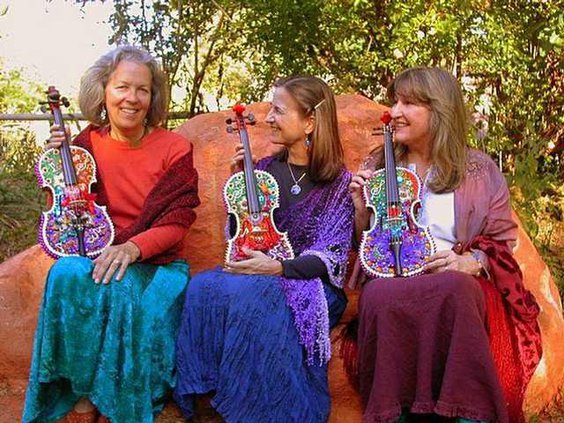The Rosin Sisters with Elise Witt and Joyce Brookshire
When: 8 p.m. Friday
Where: The Crimson Moon, 24 N. Park St., Dahlonega
How much: $10 advance, $12 day of show
More info: 706-864-3982
Ann Whitley-Singleton, Jan Smith and Barbara Panter-Connah are three friends and three fiddlers.
Each knew one another — or, at least, knew of one another — since the mid 1980s. They floated in the same fiddling circles in Atlanta and, eventually, became friends who also created beautiful music together as The Rosin Sisters.
Each has their own distinct style — Whitley-Singleton enjoys Carter family tunes from the 1920s, Smith has a bluesy style "that Barbara and I just drool over," Whitley-Singleton said, and Panter-Connah has an early honky tonk-Cajun style.
"And we all love each other's things, and it makes us have a little variety in our music," Whitley-Singleton said. "We each have sort of an area we gravitate toward, yet we love what the other loves to do."
We spoke with Whitley-Singleton, who recently moved to Dahlonega, and Panter-Connah, who will be playing with Smith at 8 p.m. Friday at The Crimson Moon in Dahlonega. They'll be sharing the stage with fellow fiddlers Elise Witt and Joyce Brookshire.
Question: Do the three of you go back a long time?
Whitley-Singleton: We have. Let's see; I met Jan probably in about '87 or '88, and I met Barbara, I saw Barbara for the first time in '81, and then really made her acquaintance in '85 or '86. We've all played in the same circles since about '87 or so.
Q: How much of what you play is traditional and how much is original?
Whitley-Singleton: We only do two numbers that are original to us, and that's a medley on the CD, "War Woman Dell March," which Jan wrote, and "Muddy Road to Copper Hill," which Barbara wrote.
Now some of the other things are traditional, but we do a number of things that other people have written. ... We do a number of Carter family songs, and ...their songs form the basis for a lot of bluegrass material, and country. And then we've got a Loretta Lynn song, which is "Everybody Wants to Go to Heaven (But Nobody Wants to Die)" ... And we have a couple of country things that Barbara brought to the group.
Q: What draws you to Appalachian fiddle music?
Whitley-Singleton: It's real. ... Jan taught herself the fiddle and began in the mid '80s and just glommed on to it, and I did the same thing only I had played violin as a child. I put it down and came back to it in the mid '80s.
All of us love dancing — we still pay for contra dances, and my grandaddy was a high school principal in North Carolina, and he used to have fiddlers conventions to raise money.
Panter-Connah: My grandfather was a fiddler in Copper Hill, Tenn. He went by Uncle Burt. He wasn't famous or anything, but he played with fiddlin' John Carson, which was a well-known fiddler from Cabbagetown but whose folks were from Fannin County. ... My grandfather gave me his fiddle when he was 80 and I was 8.
When he sang, he sounded just like a fiddle. It was hilarious to me.
I took violin when I was 8, and I hated it. It was so rigid. In fact, I love to hear beautiful violin music, but it was too much for me. I had taken piano since the time I was 3 — in the '50s everything was so strict. I wasn't allowed to play by ear, and when I got to learning fiddle tunes, you can make your own adjustments. And it just felt like home.
Q: Tell me about your jewel-encrusted fiddles, pictured?
Whitley-Singleton: Barbara's husband is Whit Connah; ... he is an artist, and before he retired he taught art at Georgia Tech for about 30 years. So, now he's loving to cover objects in these jewels and decorate, so he decorated those fiddles. And he does taxidermy things and decorates them. He covered his bass, which is very playable.
(The fiddles, however, are not playable she said.)
Q: What can we expect from your Crimson Moon show?
Whitley-Singleton: We're sharing the bill with (fiddlers) Joyce Brookshire and Elise Witt.
You'll expect a variety of material. We'll have three fiddles, two guitarists. We all three sing in harmony and sometimes we just mix it all up. We have a few a cappella things and we have fiddle numbers; we just play and all sorts of configurations of instruments and voices. We're really looking forward to it.
Panter-Connah: The fiddling, at least the style we play, is much more relaxed. I'm not able to play fancy classical violin. It takes a lot of training that I don't have, but I love the community of fiddling.
We all sit in a circle and each one takes turns choosing a song. And those beautiful melodies that have come over from England and Ireland and Scotland, and they're hundreds of years old, and you have that connection, that shared feeling.

